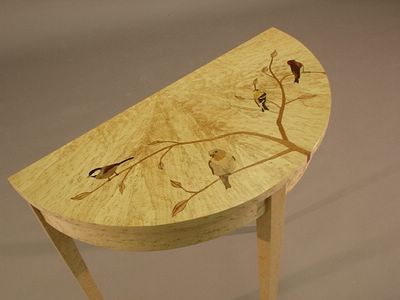Friday, December 30, 2005
Today's "Easy" Question
OK, it's not up there with "Who is buried in Grant's Tomb", but if you subscribed to the Writer's Almanac, you'd know.
Friday, December 09, 2005
The word of the day is Steganography
Does Zarqawi Take Shorthand? "Here's an amusing goof from the Associated Press: "Terrorists also have made only infrequent use of stenography, the practice of hiding a text message in another kind of file, typically a picture."Actually, stenography, also known as shorthand, is a method of taking notes. The AP meant "Steganography"
Friday, November 18, 2005
The Big Game
Folks not in SC find it hard to imagine how everyone in the Palmetto state must chose one or the other of these two schools--there is no waffling. Regardless of what team one may normally root for, everyone in the state must choose the Tigers or the Gamecocks for this game.
My personal experience with The Game goes back to 1960, the first year The Game began its home-and-home run between Clemson and Columbia after being played on Thursday of State Fair Week for years. I was a freshman at Clemson that year.


It had been traditional at Clemson for all freshman men ("Rats") to have their heads shaved and be required to wear a beanie ("rat hat") until the Big Thursday Game and on until Thanksgiving if Clemson lost to Carolina. There was some controversy that fall since the game had ben moved from mid October to the end of November but since Clemson won that day, it aas the end of rat hats that year.
Another interesting custom was that on the Friday night before the Big Game, all Rats painted their faces and went out to "guard" the campus, protecting it from USC vandals. Here is a typical group.
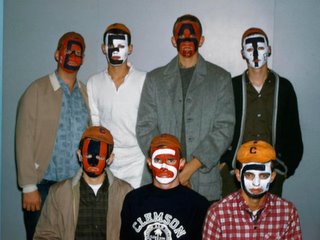
My second Clemson/USC game, my sophmore year, had several interesting highlights. I was in the Clemson precision drill team, the Pershing Rifles, and we pereformed on the field just prior to the game.
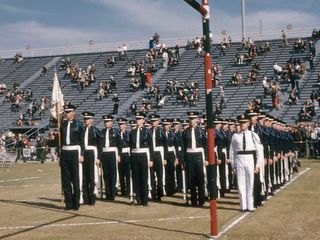
As we were waiting to begin our performance, a USC fraternity came out on the field and did a warm-up routine making considerable fun of the folks from the cow college.
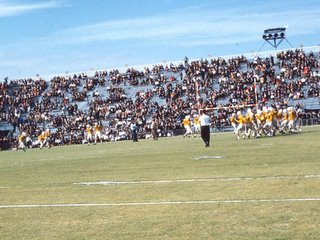
We got in our fun as well. As the drill team was marching into the stadium, one of our members, Bill Miller, the Rear Guide (and shortest man on the team) picked up a dead rooster from a Clemson fan and tied it to his side during the performance. For our Finale, we formed in two facing lines and fired a salute, and just as the salute was fired, Bill tossed the rooster high between the two lines, and it loooked for all the world like that that chicken had been plugged by32 M-1 rounds!
I don't know how reliable the linked account is, butI clearly recall that the game ended with Clemson inside the USC 10 and threatening to score the winning touchdown but losing 21-14. This was followed by a number of fights both on the field and in the stands, and I was happy we still had our drill rifles with us.

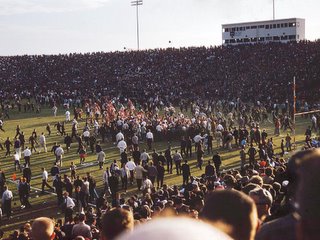
Monday, October 10, 2005
Just Wondering . . .
Thursday, October 06, 2005
The Death of Photography
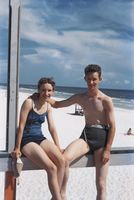
This is one of the earliest photos he took (well, I guess someone else took it since there was no self-timer on his Kodak Retina camera). I think it was made in 1939 at a beach in the Florida panhandle. The slide is so sharp that you can almost read the grafitti on the post next to them.

This 1940 photo is of my mother, pregnant with my older sister (who is now my younger sister).
My father's camera would be laughable today--a 35-mm folding model sort of like a current point-and-shoot camera, except no auto-focus, no auto-exposure, no auto-loading, even no flash. Indoor photos were time exposures (and with an f/3.5 lens and ASA 10 Kodachrome, they must have been pretty long exposures). Here are two Christmas morning scenes, after Santa came but before the kids got up. The first is 1947 and the second is 1949. The third photo shows what that room looked like in 2004.



So, you ask, what does this have to do with the Death of Old Pictures? It's just that the current boom in photography is all in digital photos. These are easy to take and easy to distribute via e-mail or sharing on the web, but they are very "fragile" as far as keeping for years and years is concerned. Sure, the CD's or DVD's on which they are archived may still exist, but what are the chances that machines will exist to read them. Digital photos from 25-years ago were stored on magnetic tape. Most have been lost because tape-readers no longer exist.
I hope if you take digital family photos, you will take seriously the issue keeping them alive so folks can enjoy them in 50 years.
Friday, September 02, 2005
Today's Pop Quiz
A. 5% B. 10% C. 25% D. 40%
I'd have missed it.
Tuesday, August 23, 2005
Lowboys
This year's lowboys were a varitety. All except Kevin's were mahogany; his was cherry. All looked great when finished. I think all of us were very pleased with how each of our pieces turned out. I know mine was the best piece I've ever made!

Bob Smith's Lowboy

Jorge Pardo's Lowboy

Jennifer Kalbus's Lowboy

Kevin Chrystie's Lowboy

My Lowboy
Sunday, August 21, 2005
Happy Birthday, Mr. Kennedy
"For when time takes you out for a spin in his car
You'll be hard-pressed to stop him from going too far
And be left by the roadside, for all your good deeds
Two toadstools for tits and a face full of weeds."
Now that is real poetry! Read the whole thing. It rhymes and scans--something rare in poetry these days.
I Don't Know Nothing About A Baby . . .
“They’re mulling several names, but the one they favor is Preston."
Friday, August 19, 2005
A Man About Town
"There were two or three things that I wanted to know. I do not care about a mystery. So I began to inquire.
"It took me two weeks to find out what women carry in dress suit cases. And then I began to ask why a mattress is made in two pieces. This serious query was at first received with suspicion because it sounded like a conundrum. I was at last assured that its double form of construction was designed to make lighter the burden of woman, who makes up beds. I was so foolish as to persist, begging to know why, then, they were not made in two equal pieces; whereupon I was shunned.
"The third draught that I craved from the fount of knowledge was enlightenment concerning the character known as A Man About Town. He was more vague in my mind than a type should be. We must have a concrete idea of anything, even if it be an imaginary idea, before we can comprehend it. Now, I have a mental picture of John Doe that is as clear as a steel engraving. His eyes are weak blue; he wears a brown vest and a shiny black serge coat."
Read the whole thing.
Free Sex With Fill-up
Bubba and Earl are driving back to Athens from Atlanta when they notice they need some gas. They start looking for a gas station and see a sign that reads "Free Sex with Fill-up." They pull in and tell the attendant to "fill 'er up." After he's done the attendant goes to the window and says that it would be $18.00 for the gas. (This is an old story.)
They pay and as the attendant starts to walk away Bubba yells "What about my free sex?". The attendant rolls his eyes and goes to the window and says, "OK, but you have to guess the magic number. It's a number between 1 and 10." Bubba said, "6." The attendant says "No, the number is 3. Sorry."
As the attendant starts to walk off Earl says, "Give me a try." The attendant says "OK." Earl says, "7." And the attendant says "No, I told you the number was 3."
Bubba then speeds off and Earl looks over and says, "I think that game was fixed. There is no way to win." To which Bubba replies, "Uh, Uh, my sister won three times last week."
Friday, August 12, 2005
Today in Baseball History
1943 An Armed Forces All-Star team managed by Babe Ruth and featuring Joe DiMaggio and Ted Williams play a fund-raising game against the Braves in Boston. The All Stars win on a Splendid Splinter's' home run, 9-8.
This sounds like it was a terrific game. Also listed:
I took a little while to realize we had the month wrong--this all happened on July 12, not August 12, but it was still a great day in baseball history. Read the whole thing.1901 At Boston's Huntington Avenue Baseball Grounds, Cy Young of the Americans seven-hits the A's, 5-3, to win his 300th game. The 34-year old will win an additional 211 games to establish an amazing major league record of 511 career victories.
1932 After setting a major league record in the first game with nine doubles, the Cubs and Cardinals combined to hit another twenty-three two-baggers in the second game for an incredible total of thirty-two doubles in their doubleheader.
1945 Braves' outfielder Tommy Holmes goes hitless ending his consecutive-game hitting streak at 37 which sets a National League record. The mark will stand until Pete Rose surpasses it in 1978.
1949 The first All-Star game which includes black players is played at Ebbets Field. Roy Campanella, Jackie Robinson and Don Newcombe represent the National League in an 11-7 loss to Larry Dolby and his AL teammates.
1955 At Milwaukee's County Stadium, Stan Musial comes to bat in the bottom of 12th inning of a 5-5 All Star deadlock. American League catcher Yogi Berra complains about his feet hurting and Musial tells him "Don't worry, I'll have you home in a minute"......then 'the Man' hits a game-winning home run on the next pitch.
1979 After a delay of an hour and 16 minutes, the White Sox are forced to forfeit the second game of twi-night doubleheader against the Tigers when over 5000 adolescent fans refuse to leave the field during Disco Demolition Night. Mike Veeck's promotion involves admitting fans for .98 cents with a disco record, collecting the vinyl and then literally blowing up the LPs and .45s in center field.
1997 Pitching for the first time in Fenway not wearing a Red Sox uniform, Roger Clemens strikes out sixteen as the Blue Jays defeat Boston, 3-1. During the game, it appears the 'Rocket' is continually glaring up at Dan Duquette in the general manager's suite.
Sunday, August 07, 2005
Birkenstocks
Many of the shoes were sold to the scouts by Birkenstock, a local shoe manufacturer, for discounted prices… allowing the troop to send high quality sandals for the girls to wear in the upcoming school year. According to Wei, the girls were thrilled with the gift. “They were just so extremely happy to get a new pair of shoes,” he said.
Saturday, August 06, 2005
Friday, August 05, 2005
The Plame Affair Explained
Tuesday, August 02, 2005
Dan Overby's Prizewinning Table
The birds on the top are marquetry, made from wood veneers of different species and colors and inlayed in the bird's-eye maple veneer top.
I'm trying to get some better shots, but these can do in a pinch.


Table-top Detail
Sunday, July 31, 2005
Josh Williams Runs the Table in Vegas
"I'm pleased to report that the RCC Fine and Creative Woodworking program was extremely successful in the Student Design Competition at the AWFS fair in Las Vegas. All entries from RCC received recognition from the judges:
Dan Overby received an honorable mention for his demilune table
Josh Williams swept the competition by receiving 5(!) awards:
First place (traditional chair category) for his corner chair.
First place (traditional case goods category) for his block front desk.
"Best in Show" for the desk - this means his piece was selected over all entries by the judges regardless of category.
"Peoples Choice Award" - voted on by attendees of the AWFS show as the best piece in the competition.
"Craftsmanship Award" - bestowed by Fine Woodworking editors as the piece exhibiting the best craftsmanship in the competition.
I expect Josh and his desk will be in all the woodworking magazines over the next few months - he has also received several employment inquiries from attendees at the show.
Congratulations to Dan and Josh for their fine work and professional representation of RCC at the show."
Front View of Desk
Desk Side View
Desk Foot Detail
Josh's Corner Chair
Saturday, July 16, 2005
What He Said . . .
Stephen Green at Vodkapundit has gotten the criticism exactly right, I think.
Saturday, June 18, 2005
"Good fences make good neighbors."
In the poem, the poet and his neighbor walk their common stone-wall fence in the spring, picking up and replacing rocks and stones that have fallen during the winter. After some time, the poet observes"That sends the frozen-ground-swell under it,
And spills the upper boulders in the sun;
And makes gaps even two can pass abreast."
"There where it is we do not need the wall:
He is all pine and I am apple orchard.
My apple trees will never get across
And eat the cones under his pines, I tell him.
He only says, “Good fences make good neighbours.”
Spring is the mischief in me, and I wonder
If I could put a notion in his head:
“Why do they make good neighbours? Isn’t it
Where there are cows?
But here there are no cows.
Before I built a wall I’d ask to know
What I was walling in or walling out,
And to whom I was liketo give offence.
Something there is that doesn’t love a wall,
That wants it down.”And the poem ends:
"He will not go behind his father’s saying,
And he likes having thought of it so well
He says again, “Good fences make good neighbours.”
I was reminded of this when a fence was erected this week along the edge of part of Hamilton Lake.

The purpose of the fence, which is supposed to be temporary, is to protect the newly planted grass from the lake's geese population.
Now, if neighbors want to fence off their yards from the geese, more power to them, but I look forward to the public path being fence-free.
By the way, the collection of almost all the lake's geese population seen in the lower photo was because one family of juvenile goslings had gotten through the fence and couldn't figure out how to get back. They got very upset by dogs walking on the path, even though the dogs paid no attention to them. After several minutes they found a way under the fencing and back to the rest of the geese, and geese-life got back to normal on the lake.
New Neighbors
New Construction
Not to be outdone, I want to blog about new construction on the Lake Henderson walking trail, specifically the new Friendly Road bypass. Presently, only the rough grading has been done, but when completed, the new section will connect Lakewood Drive with the Starmount Drive path, bypassing the stone gates at Friendly Road. This will necessitate one new bridge construction. I'm guessing that even after Friendly Road is widened (the stone entrance gates are not supposed to be affected in the widening) the present path behind the stone wall will remain, and the new path will just be a short-cut. Here are some photos:

New Path

Path Construction

Bridge site

Path Behind Stone Wall
Another Small Pleasure Gone

Now someone has decided that feeding is a bad idea and has posted signs asking people not to feed the ducks and geese.

I suspect this is to discourage the geese as much as it is for their long-term benefit, and I'm thinking the birds would not have supported this step had they be given a vote. I wonder if the folks who backed the Don't Feed The Geese movement would support a similar tough-love approach to human welfare programs?
Saturday, June 11, 2005
Ain't It The Truth
"Men volunteer to fight, bleed and die for the United States of America because she is the last, best hope for peace and freedom on earth," he said. "They consider the evidence that America has pushed back the veil of tyranny and saved countless millions of men, women and children from imprisonment, torture, starvation, humiliation and brutal death. And they act on that evidence, knowing that the blood of free men is always the price of freedom. While critics jabber about global diplomacy, these men step into the breach to shield us all from the peril of our naiveté about the so-called 'basic goodness of humanity'."
Friday, June 10, 2005
Ultimate Scottish-Irish Golf Trip
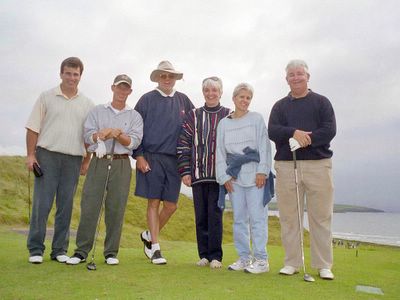
When Brenda and I went on a golfing trip to Ireland in 1998 with Nikki and Bob Kober, two of the unforgettable characters we met were Dennis and Chris, two brothers-in-law from Texas. (They are the two guys on the left in the above photo--I didn't record their last names.) The one on the left, Dennis I think, was taking his medical software company public and was in the middle of the Quiet Time, so he and Chris were on a 14-day, 27-different-golf-course tour of Scotland and Ireland. They were playing (walking and carrying their bags) 36 holes each day and travelling each evening to the next location. They would have played 28 courses, but it took half a day to get from Scotland to Ireland.
We met them in the morning when Bob and I were paired with them at Tralee Golf Course, and we were all planning to play Ballybunion Golf Links that afternoon, so we arranged to be paired together again there. Also playing at Ballybunion that day were Tiger Woods, Mark O'Meara, and Payne Stewart, who were leaving just as we arrived about 3:30, and Ernie Els and friends, who played just in front of our group. When we caught up with the Els group on the 15th tee, we decided not to ask to play through, though they did have a good-sized gallery and were playing pretty slowly.
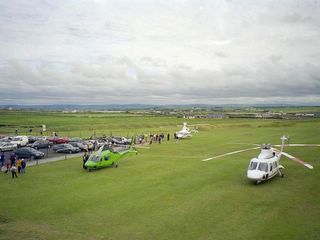
How the Big Boys travel!

15th Green
The Geographic Solution
I was reminded of the Geographic Solution this morning when I heard this report on Morning Edition. It is surprisingly conservative and Bush-administration-friendly compared to many NPR reports. I had read this article by Heather MacDonald at NRO Online yesterday, and it seemes true that the sins of Gitmo are self-fulfilling prophecies. If Guantanamo were closed, administration critics would just carp about some other prison somewhere else. It's not the prison they are concerned about, it is the Bush Administration.
Happy 70th Anniversary
Monday, June 06, 2005
D-Day
At first, I was just going to post some photos made in and around the Normandy battlefields, (click for larger views):

Ste. Mere Eglise Church

Stained Glass Windows

Pont du Hoc Battlefield

Pont du Hoc Monument

American Invader

"Crosses, Row on Row"
So I thought I might comment on the overall level of casualties during the invasion, which was generally less than most people think. Overall, there were about 9,000 casualties (killed, wounded, missing, captured, some 3,000 killed) out of 156,000 troops landed that day--about a 6% casuality rate and a 2% killed rate. See here, here and here. A US Army website reports: "Although victorious against the first wave of invaders at OMAHA, the Germans could do little when the force on the beach began to renew itself. With many of their troops off in pursuit of the dummy paratroopers the Allies had dropped far to the rear, they could hold their own from fixed positions but lacked the numbers to drive the invaders back. Thus the Americans kept the ground they gained. Inch by inch they moved forward, up through the bluffs and onto the flatland above. In the absence of much room to maneuver, their attack had been unoriginal, a straightforward frontal assault, but the weight of their numbers and the enormous volume of supplies and equipment they began to bring to bear made the difference. By nightfall, 34,000 men were ashore on OMAHA. The beach itself was a shambles of burning and disabled vehicles, but almost all of the coastal villages located inland were in Allied hands."
Then, as I was checking the usual blogs, I realized that the battle is still going on. You can read about some recent engagements here and here.
Ah well, Blogger (the software, not the writer) is acting up and doesn't want to finish this post, so I'll quit here.
Saturday, June 04, 2005
Did you know about this guy?
I love the opening of the speech:
As I was leaving the hotel this morning, a doorman asked me, "Where are you bound for, General?" And when I replied, "West Point," he remarked, "Beautiful place. Have you ever been there before?"
The Most Important Date in the Twentieth Century
On June 4, 1942, Japan lost WW2 in the battle of Midway. In the span of 20 minutes, a squadron of American dive bombers stumbled upon the Japanese fleet preparing to invade Midway Island and put three of four Japanese aircraft carriers out of commission. Later in the day, the fourth was destroyed. Japan couldn't recover. It took three more difficult years to drive Imperial Japan to surrender, including the worst of war on both sides (kamikazis, Iwo Jima and Okinawa, fire-bombing cities, the atomic bombs), but the fate of the Japanese was determined. With the sinking of the Akagi, Kaga, Soryu, and Hiryu, they could no longer win the war.
There wasn't a corresponding decisive battle in the European Theater. Some might argue that the first six hours of the Normandy Invasion signaled the end of the war, but by then the industrial might of the Allies (OK, "America") had already won the war. The European Theater was more a case of the Germans losing the war than the Allies winning.
In the spring of 1940, a large part of the British army was in Belgium to defend France from the expected invasion from Germany. The German attack began on May 11, and by May 22 it was evident the British were being overwhelmed. The British had been driven back to a small perimeter around the French port of Dunkirk, and they were hard-pressed to hold off the superiour German forces. The British began an evacuation that, for a variety of reasons, wasn't working. However, on May 29, Hitler stopped the German panzer attacks and gave the infantry and air force the job of destroying the British. This gave the English time to mobilize a "flotilla of fishing boats, lifeboats, paddle steamers, and yachts" to rescue the more than 300,000 British and French troops trapped around Dunkirk. By June 4, the evacuation was complete.
Interestingly, as Garrison Keillor points out in today's Writers' Almanac or (click here for written version), it was the decision of Winston Churchill to treat the returning servicemen as heros rather than as a defeated army that lead to the victory over Germany five years later.
Can we learn anything from these events 60+ years later?
-----------------------------------
If you listen to the the full reading of the Writer's Almanac, you'll hear the Poem of the Day. Some of us think that if it doesn't rhyme and isn't written in meter, it's just prose in very short paragraphs, but I'll cut the poem "Pulling Up Beside My Husband at the Stoplight" some slack.
Is That All There Is?
Reparations
By the way, does anyone else share my concern about whether you could ever trust a bank that can't even tell the truth about its name?
Manhole Covers
When Abby-the-Wonderdog came to live with me and we began our neighborhood walks, we saw a lot of different manhole cover designs. I don't know much about sewer systems, but I do know there are actually two different sewer systems in town. The sanitary system drains to the sewage treatment plant. It carries sewage from houses and other buildings. The stormwater system drains rain and surface water to creeks and lakes. I'm guessing you can identify the two by the manhole covers, marked S or SW.


(There is at least one unmarked cover in the neighborhood. Who knows where it goes.)

Because of the environmental effects of surface drains, many street drains are marked to remind citizens not to pollute.

Some of the street drains have manholes (and covers) in them. When I was growing up in the Westerwood neighborhood, my buddies and I often played ball (one o'cat, two o'cat, roll-a-bat) in the 300 block of Mimosa Drive. There was a ball-magnet street drain there that regularly attracted our ball. Then someone would have to go up to the Cribbins and borrow their coal-furnace-stoker (a long steel rod) so we could pry off the cover and send someone down to recover the ball.
Many manholes seem to be advertisements for the company that made them or installed them. (Click to enlarge.)

Some of these are self-evident; one took a little research from Google to find out that EJIW is the East Jordan Iron Works in East Jordan, Michigan. Also, I can remember Greensboro from about 1950 on, and I have no memory of the Pomona Foundry. Was it in the Pomona area, maybe near the old railroad roundhouse?
Some manhole covers are quite decorative.

Others combine the ecological reminder into the cover.

This cover points up another interesting point. Note that it is "Made in India". Upon further review, some of the other covers (Capital Foundry and Triad Masonery) are also from India.

Manhole covers seem to be a pretty low-tech item--a slab of cast iron and a little casting labor. It can't take much labor to make one, and there must be a fair amount of expense in shipping the finished product from India (and probably the raw scrap iron from which it's made to India). Just how much can the labor savings be??? This reminds me of the scene near the end of the movie "Battle of the Bulge" where the German tank commander finds a cake that has been shipped from the US as a Christmas present to an American soldier. He realizes the war must be lost if the Allies have the capability to ship this kind of thing across the Atlantic while the Germans are scrounging for gasoline. Is the World Trade Battle at a similar point?
One last observation. manholes seem to be very social. They are often near each other,

and along the Painter Boulevard section of the Hamilton Lakes walking trail, there is a congregation of three Sanitary manholes.

So much for manholes and their covers.

